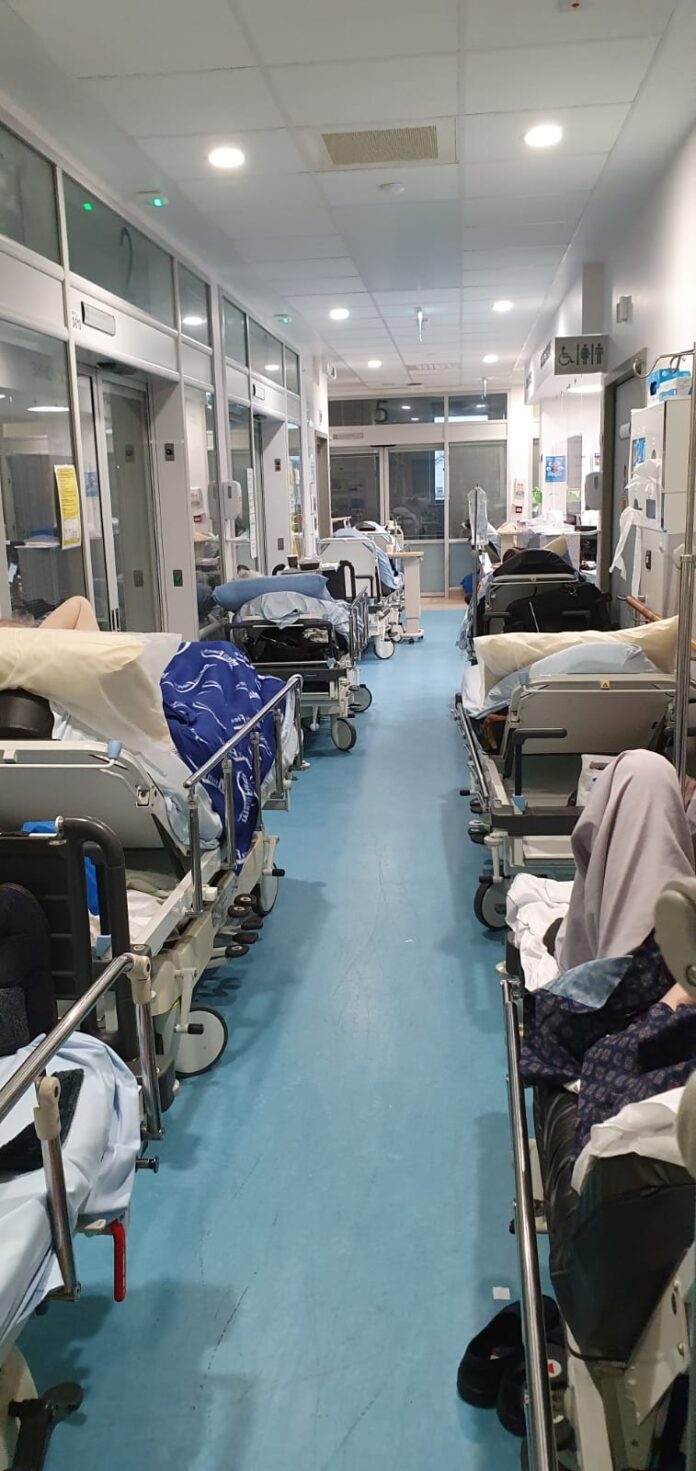
AFTER reaching a second milestone which saw the hospital being the most overcrowded in the county for 100 consecutive days according to figures published by the Irish Nurses and Midwives Organisation, University Hospital Limerick has apologised and admitted that capacity “remains a challenge”.
In a statement to the Limerick Post, a spokesman said, We regret the impact on and inconvenience to any admitted patient who has experienced long waits for inpatient beds in University Hospital Limerick (UHL). The current level of inpatient bed capacity remains a challenge in the face of increases in demand for emergency care”.
Outlining the demand, the statement points out that during the first quarter of 2024, there were 21,298 presentations to the Emergency Department (ED) at UHL, a 14% increase on the same period last year. And provisional data for Q2 is tracking a similar volume of presentations during the April-June quarterly period, the hospital says.
“With this in mind, we welcome all support from national HSE and Government in progressing a variety of infrastructural and other developments on the ground here, including the two 96-bed developments for UHL.
“While we must continue to provide care to increasing numbers of patients within the constraints outlined above until this additional capacity comes on stream, these developments, and other initiatives, will significantly address our capacity shortfall and improve patient flow in the coming years”.

- External Walls: Up to €8,000 Grant
- Attic: Up to €1,500 Grant
- Cavity Walls: Up to €1,700 Grant
- Internal Dry Lining: Up to €4,500 Grant
The various projects and supporting initiatives include:
96 bed blocks
Work commenced on the first 96-bed ward block at UHL in September 2022. It is envisaged that the construction phase will be complete by Q1 2025. Once handed over by the contractors, the new build will need to be equipped and commissioned and staff trained following the completion of a recruitment campaign. We anticipate that this much-needed additional bed capacity for the Mid-West will become operational in mid-2025.
“We welcome the commitment by the Minister for Health Stephen Donnelly and the HSE to accelerate the delivery of the second 96-bed block at UHL. The construction phase will be completed in two stages, and will be carried out directly adjacent to the 96-bed block currently under construction at UHL. Subject to planning and procurement, it is envisaged this project will be delivered by 2027,”the statement said.
Additional Supports
During his visit to UHL on Thursday April 4t 2024 the Minister for Health Stephen Donnelly announced a number of additional supports including:
- The commencement of a procurement process for the temporary operation of the 50-Bed Community Nursing Unit in Nenagh as a step down sub-acute and rehabilitation facility for UHL for one year until the first 96 bed block is opened
- A change in the bed profile for the first 96 bed block increasing the number of additional beds from 48 to 72
- A further 20 permanent step down transition and rehab beds will be procured in Clare
- 16 additional fast build beds are to be commissioned at UHL with this capacity to be available in advance of next winter’s surge
- Opening hours of the Acute Medical Assessment Units at Nenagh, Ennis and St John’s Hospitals are to be extended to 24/7 on a phased basis
- Safe staffing will be extended to all wards in UHL as per the national rollout
- UHL is to be one of two national test sites for Acute Virtual Wards
- UHL will provide GP and Advanced Nurse Practitioner-on-the-door services for the ED in an effort to alleviate overcrowding and allow the ED staff to treat urgent and emergency patients in a more timely manner
“In the meantime, we continue to follow our Escalation Framework in order to reduce pressure on the ED and improve patient flow across our sites. Specific escalation measures include the opening of surge capacity in UHL and across all sites; transfers of patients on trolleys in ED to our inpatient wards; additional ward rounds by medical teams to expedite discharges or to identify patients suitable for transfer to Ennis, Nenagh and St John’s Hospitals; and close collaboration with our colleagues in community healthcare services to expedite discharges. The Framework also provides for reductions of scheduled care when demand for emergency care is at a peak,” the statement concluded.

